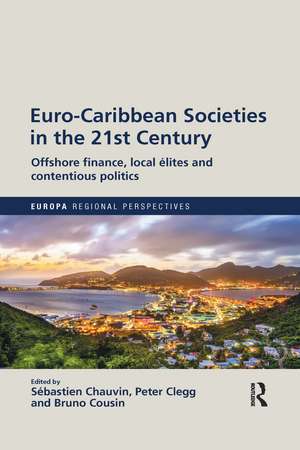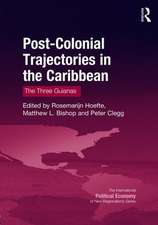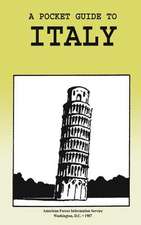Euro-Caribbean Societies in the 21st Century: Offshore finance, local élites and contentious politics: Europa Regional Perspectives
Editat de Sébastien Chauvin, Peter Clegg, Bruno Cousinen Limba Engleză Paperback – 30 iun 2020
Although known and perhaps infamous for their role as high-end tourist destinations and financial centres, these small jurisdictions are complex and multifaceted places. While this volume considers their role as financial centres, it does so from alternative and original perspectives by examining how the sector shapes the internal dynamics of these Caribbean societies, and how it is itself shaped by global trends. A range of contributions is included that highlight other key issues. Political relations between the territories and their metropolitan centres and with the European Union are the focus of several chapters, highlighting the stresses and strains, and in many cases the unfulfilled expectations of devolved governance. Further chapters describe the economic instability and factors of political conflict faced by some of these societies and the available options to address them. Finally, several chapters reflect more specifically on the territories’ internal social and ethnic dynamics, and the hierarchies and inequalities that result.
Bringing together a variety of different disciplinary perspectives, from political science to sociology, and from anthropology to geography, this book will be of great interest to any academic or student who wishes to see how an often overlooked part of the world is actually a key site of socio-economic transformation and a crucial nexus in global affairs.
Sébastien Chauvin is a sociologist and an Associate Professor at the Institut des Sciences Sociales at the University of Lausanne, Switzerland. His research deals with immigration, citizenship, gender, sexuality, law and labour in France and the USA. With Bruno Cousin, he has also developed a multi-sited research programme on social and symbolic capital and the cultural sociology of economic élites, with a focus on Western Europe (élite male social club sociability), the Caribbean region (Saint-Barthélemy), and new forms of conspicuous consumption among the global super-rich. His other ongoing writing explores the intersections of race, nationalism, sexuality and citizenship in the Netherlands, France and the USA.
Peter Clegg is Associate Professor in Politics and Head of the Department of Health and Social Sciences at the University of the West of England, Bristol, UK. He was formerly Visiting Research Fellow at both KITLV/Royal Netherlands Institute of South East Asian and Caribbean Studies, Leiden, Netherlands, and at the Sir Arthur Lewis Institute of Social and Economic Studies (SALISES), University of the West Indies, Jamaica. His main research interests focus on contemporary developments within the United Kingdom Overseas Territories and the international political economy of the Caribbean.
Bruno Cousin is Assistant Professor of Sociology at Sciences Po, France, and an affiliate of the Centre of European Studies and Comparative Politics (CEE), France. Previously, he was Assistant Professor at the University of Lille, France, and Postdoctoral Research Fellow at Harvard University, USA, and has held visiting positions at NYU, the University of Amsterdam and Birkbeck. His research interests focus on class relations, residential segregation, social capital and forms of bourgeois sociability, and the modes of élites’ legitimization. He is currently conducting research with Sébastien Chauvin on Saint-Barthélemy (French West Indies), whose first results have been published in Ethnologie française and Geographies of the Super-Rich (2013), and he has recently co-authored Ce que les riches pensent des pauvres (2017).
| Toate formatele și edițiile | Preț | Express |
|---|---|---|
| Paperback (1) | 253.67 lei 6-8 săpt. | |
| Taylor & Francis – 30 iun 2020 | 253.67 lei 6-8 săpt. | |
| Hardback (1) | 736.38 lei 6-8 săpt. | |
| Taylor & Francis – 29 mai 2018 | 736.38 lei 6-8 săpt. |
Din seria Europa Regional Perspectives
- 8%
 Preț: 390.16 lei
Preț: 390.16 lei -
 Preț: 342.00 lei
Preț: 342.00 lei -
 Preț: 371.23 lei
Preț: 371.23 lei - 18%
 Preț: 1160.47 lei
Preț: 1160.47 lei -
 Preț: 381.55 lei
Preț: 381.55 lei -
 Preț: 449.41 lei
Preț: 449.41 lei -
 Preț: 382.68 lei
Preț: 382.68 lei -
 Preț: 389.88 lei
Preț: 389.88 lei -
 Preț: 460.69 lei
Preț: 460.69 lei -
 Preț: 409.87 lei
Preț: 409.87 lei -
 Preț: 389.66 lei
Preț: 389.66 lei - 29%
 Preț: 254.60 lei
Preț: 254.60 lei - 29%
 Preț: 252.79 lei
Preț: 252.79 lei - 28%
 Preț: 207.60 lei
Preț: 207.60 lei - 29%
 Preț: 241.15 lei
Preț: 241.15 lei - 15%
 Preț: 209.80 lei
Preț: 209.80 lei -
 Preț: 390.25 lei
Preț: 390.25 lei -
 Preț: 187.09 lei
Preț: 187.09 lei -
 Preț: 386.18 lei
Preț: 386.18 lei - 18%
 Preț: 1004.72 lei
Preț: 1004.72 lei -
 Preț: 449.41 lei
Preț: 449.41 lei -
 Preț: 389.66 lei
Preț: 389.66 lei
Preț: 253.67 lei
Preț vechi: 303.89 lei
-17% Nou
Puncte Express: 381
Preț estimativ în valută:
48.55€ • 52.71$ • 40.78£
48.55€ • 52.71$ • 40.78£
Carte tipărită la comandă
Livrare economică 22 aprilie-06 mai
Preluare comenzi: 021 569.72.76
Specificații
ISBN-13: 9780367590567
ISBN-10: 0367590565
Pagini: 214
Dimensiuni: 156 x 234 mm
Greutate: 0.45 kg
Ediția:1
Editura: Taylor & Francis
Colecția Routledge
Seria Europa Regional Perspectives
Locul publicării:Oxford, United Kingdom
ISBN-10: 0367590565
Pagini: 214
Dimensiuni: 156 x 234 mm
Greutate: 0.45 kg
Ediția:1
Editura: Taylor & Francis
Colecția Routledge
Seria Europa Regional Perspectives
Locul publicării:Oxford, United Kingdom
Cuprins
Introduction – Offshore Europe on the move
Sébastien Chauvin, Peter Clegg and Bruno Cousin
Part I: Institutional, Political and Regulatory Processes: The transformation of relations with the metropolitan states, the EU, and the international community
1 The British Overseas Territories in the Caribbean and their quest for further autonomy
Peter Clegg
2 Status Change in the Caribbean part of the Kingdom of the Netherlands: What for?
Lammert de Jong and Ron van der Veer
3 The French Caribbean between egalitarian aspirations and identity assertions: Towards a realisation of difference?
Justin Daniel
4 From Brussels with love: Shifting governance and the evolution of ‘Overseas Europe’
Matthew Louis Bishop and Genève Phillip
5 Brexit and the Overseas Territories: Repercussions for the periphery
Peter Clegg
6 Global financial governance and the Euro-Caribbean overseas territories: First and second order effects for offshore finance
William Vlcek
Part II: Economic Transformations, Local Elites and the Current Dynamics of Inequality
7 Colonial heritages and continuities in Guadeloupe and Martinique: An economic perspective
Guy Numa
8 A postcolonial economy? Protesters, lobbyists and small-business-owners in Martinique after 2009
Audrey Célestine
9 French Guiana – A ‘Plural Society’ in a post-colonial context
Gérard Collomb and Edenz Maurice
10 Deconstructing development: immigration, society and economy in early 21st century Cayman
Roy Bodden
11 Sub-elites as fiduciary gatekeepers of global elites: A fiscal anthropology of the Cayman Islands as an offshore financial centre
May Hen
12 Integration with the Metropolis: The Dutch Caribbean ‘municipalities’ after 2010
Wouter Veenendaal
13 Intimacy and integration: The ambivalent achievement of marriage equality in the Dutch Caribbean, 2007-12
Chelsea Schields
Sébastien Chauvin, Peter Clegg and Bruno Cousin
Part I: Institutional, Political and Regulatory Processes: The transformation of relations with the metropolitan states, the EU, and the international community
1 The British Overseas Territories in the Caribbean and their quest for further autonomy
Peter Clegg
2 Status Change in the Caribbean part of the Kingdom of the Netherlands: What for?
Lammert de Jong and Ron van der Veer
3 The French Caribbean between egalitarian aspirations and identity assertions: Towards a realisation of difference?
Justin Daniel
4 From Brussels with love: Shifting governance and the evolution of ‘Overseas Europe’
Matthew Louis Bishop and Genève Phillip
5 Brexit and the Overseas Territories: Repercussions for the periphery
Peter Clegg
6 Global financial governance and the Euro-Caribbean overseas territories: First and second order effects for offshore finance
William Vlcek
Part II: Economic Transformations, Local Elites and the Current Dynamics of Inequality
7 Colonial heritages and continuities in Guadeloupe and Martinique: An economic perspective
Guy Numa
8 A postcolonial economy? Protesters, lobbyists and small-business-owners in Martinique after 2009
Audrey Célestine
9 French Guiana – A ‘Plural Society’ in a post-colonial context
Gérard Collomb and Edenz Maurice
10 Deconstructing development: immigration, society and economy in early 21st century Cayman
Roy Bodden
11 Sub-elites as fiduciary gatekeepers of global elites: A fiscal anthropology of the Cayman Islands as an offshore financial centre
May Hen
12 Integration with the Metropolis: The Dutch Caribbean ‘municipalities’ after 2010
Wouter Veenendaal
13 Intimacy and integration: The ambivalent achievement of marriage equality in the Dutch Caribbean, 2007-12
Chelsea Schields
Notă biografică
Sébastien Chauvin is a sociologist and an associate professor at the Institut des Sciences Sociales at the University of Lausanne, Switzerland. His research has dealt with immigration, citizenship, gender, sexuality, law and labour in France and the USA. With Bruno Cousin, he has also developed a multi-sited research programme on social and symbolic capital and the cultural sociology of economic élites, with a focus on Western Europe (élite male social club sociability), the Caribbean region (Saint-Barthélemy), and new forms of conspicuous consumption among the global super-rich. His other ongoing writing explores the intersections of race, nationalism, sexuality and citizenship in the Netherlands, France and the USA.
Peter Clegg is Associate Professor in Politics and Head of the Department of Health and Social Sciences at the University of the West of England, Bristol, UK. He was formerly Visiting Research Fellow at both KITLV/Royal Netherlands Institute of South East Asian and Caribbean Studies, Leiden, Netherlands, and at the Sir Arthur Lewis Institute of Social and Economic Studies (SALISES), University of the West Indies, Jamaica. His main research interests focus on contemporary developments within the United Kingdom Overseas Territories and the international political economy of the Caribbean.
Bruno Cousin is Assistant Professor of Sociology at Sciences Po and an affiliate of the Centre of European Studies and Comparative Politics (CEE), France. Previously, he was Assistant Professor at the University of Lille, France, and Postdoctoral Research Fellow at Harvard University, USA, and has held visiting positions at NYU, the University of Amsterdam and Birkbeck. His research interests focus on class relations, residential segregation, social capital and forms of bourgeois sociability, and the modes of élites’ legitimization. He is currently conducting research with Sébastien Chauvin on Saint-Barthélemy (French West Indies), whose first results have been published in Ethnologie française and Geographies of the Super-Rich (2013), and he has recently co-authored Ce que les riches pensent des pauvres (2017).
Peter Clegg is Associate Professor in Politics and Head of the Department of Health and Social Sciences at the University of the West of England, Bristol, UK. He was formerly Visiting Research Fellow at both KITLV/Royal Netherlands Institute of South East Asian and Caribbean Studies, Leiden, Netherlands, and at the Sir Arthur Lewis Institute of Social and Economic Studies (SALISES), University of the West Indies, Jamaica. His main research interests focus on contemporary developments within the United Kingdom Overseas Territories and the international political economy of the Caribbean.
Bruno Cousin is Assistant Professor of Sociology at Sciences Po and an affiliate of the Centre of European Studies and Comparative Politics (CEE), France. Previously, he was Assistant Professor at the University of Lille, France, and Postdoctoral Research Fellow at Harvard University, USA, and has held visiting positions at NYU, the University of Amsterdam and Birkbeck. His research interests focus on class relations, residential segregation, social capital and forms of bourgeois sociability, and the modes of élites’ legitimization. He is currently conducting research with Sébastien Chauvin on Saint-Barthélemy (French West Indies), whose first results have been published in Ethnologie française and Geographies of the Super-Rich (2013), and he has recently co-authored Ce que les riches pensent des pauvres (2017).
Descriere
This volume examines political, economic and social change, and inter-group relations in the European islands of the Caribbean over the last decade, addressing the major institutional transformations of recent years as the impacts of wider global change - economic transformations, roles of the local elites, and the current dynamics of inequality














